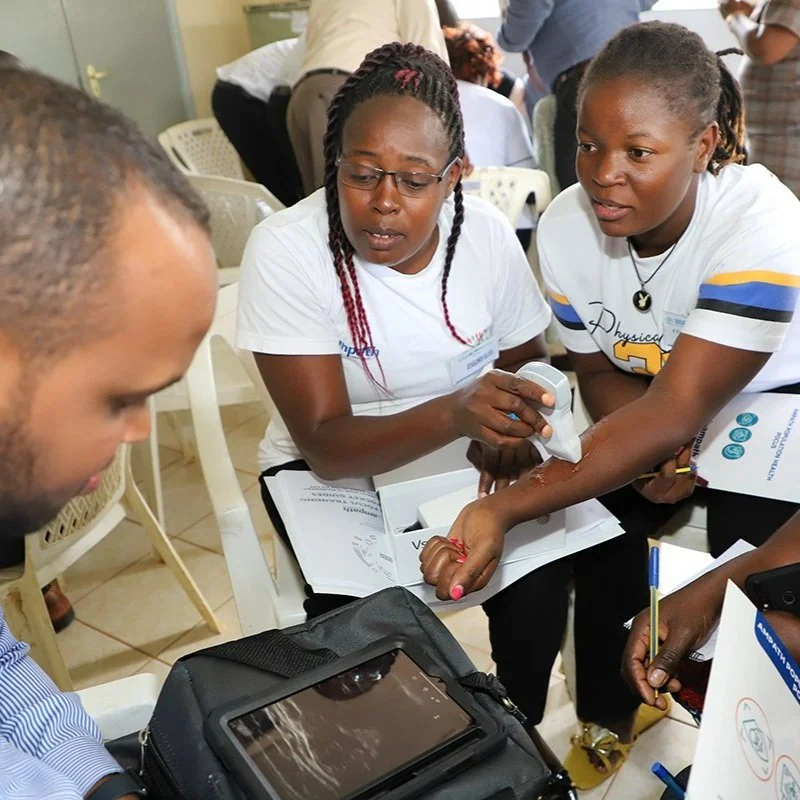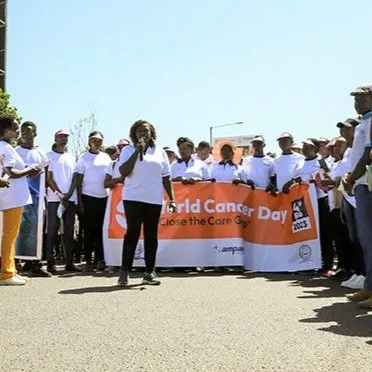
OUR WORK > CARE PROGRAMS
Cancer
BUILDING CAPACITY FOR CANCER CARE IN KENYA.
Cancer is projected to become the leading cause of death in sub-Saharan Africa, but as recently as a decade ago, there were no cancer treatment options available in western Kenya.
AMPATH has built a system of cancer treatment and prevention to combat this trend. In 2016, we opened the Chandria Cancer and Chronic Disease Centre at Moi Teaching and Referral Hospital in Kenya, which serves as a learning institute to train the next generation of Kenyan caregivers, and provides a home for robust research and care.
We’ve also assisted the Kenyan Ministry of Health in drafting the Kenya National Cancer Control Strategy, which helps formulate national health policies, solutions to current national health problems, and plans for health professional training.
1000+
Cancer patients treated each month
65+
Oncology doctors, nurses and physician extenders trained
15+
Clinical sites with established cancer treatment and care

AREAS OF FOCUS
More women in Kenya are lost to cervical cancer than any other cancer. That’s why it’s a key focus of our work in cancer care, along with breast cancer. We’ve set up screening clinics locally that screened approximately 200,000 Kenyan women for cervical and breast cancers. And we’re working to improve education about the importance of screening, follow-up, and prevention, not just for cancer but for the strongly linked Human Papillomavirus (HPV).
For patients with hematological conditions such as sickle cell disease, hemophilia, and multiple myeloma, follow-up care and regular access to treatment is critical. That’s why AMPATH has established rural outreach clinics for hematology patients to be seen on a weekly basis, and we’ve been able to host daily clinics at the AMPATH Centre. Additionally, we are supporting five county hospitals to conduct screenings, educate medical personnel and conduct research. Together with the Indiana Hemophilia and Thrombosis Center, we’re also training doctors and healthcare professionals in hematology as part of our exchange programs.
Before 2007, no treatment for pediatric cancer existed in Western Kenya. In 2010, AMPATH began oncology training opportunities for doctors, students, nurses, and other health care providers to test, diagnose, and treat pediatric cancer through collaboration with VU University Medical Centre in the Netherlands and Riley Children’s Hospital, Indiana University in the US. Childhood cancers must be aggressively treated early and effectively in the first round to help kids survive. AMPATH Oncology has dramatically reduced the time in diagnosis for cancers like Burkitt Lymphoma, Acute Lymphoblastic Leukemia, and Nephroblastoma among others, from multiple weeks to a few days.
The Telemedicine and Telepathology Center at Moi Teaching and Referral Hospital is making a difference in remote areas of western Kenya by bringing medical care virtually to communities. Patients and families can now save on transportation costs and time that come with travel to clinics or the hospital. Fully trained oncology professionals and experts at the Centre can now connect remotely with rural clinics and care for patients who might not otherwise have had access to cancer care. The Centre also allows both local and international oncology specialists to conduct lectures, consultation and patient case reviews virtually, helping share knowledge from across our partnerships.
AMPATH Oncology is educating the next generation of cancer healthcare providers by providing extensive resources, mentoring and training programs for medical students, residents, fellows, nurses and more. In 2017, a formal Preceptorship Program for oncology training was established. The program provides resources for physicians continuing to build their skills and broadens opportunities for the highest-quality care across the continuum of prevention, treatment, palliative care, and survivorship. In addition to academic and clinical training, the program is developing a center of excellence and increasing oncology research capacity.
YOUR GIFT MAKES A DIFFERENCE.
$25
Biopsy needle to diagnose a childhood cancer
$45
Lab testing for leukemia and lymphoma to perform flow cytometry
$100
Cervical cancer screening for 25 women
$500
Complete treatment for a patient with curable non-Hodgkin’s lymphoma

LATEST NEWS ON CANCER
A new 4-year grant to Moi University and AMPATH Kenya will enhance AMPATH’s patient-centered primary care by working with local leadership in six counties in western Kenya through training on and use of portable point-of-care ultrasound (POCUS).
Fifty thousand women in Nepal and Kenya will be screened for breast and cervical cancer through a new 3-year AMPATH Global initiative.
Women living with HIV are more prone to cervical cancer than their HIV negative counterparts. USAID Dumisha Afya is leading a raft of interventions, not only against HIV, but also cervical cancer.
For more than a decade, AMPATH partners led by Festus Njuguna, MBChB, MMed, PhD, and Gilbert Olbara, MBChB, MMed, have worked together to build a pathway to optimal childhood cancer care at Moi Teaching and Referral Hospital (MTRH) and throughout western Kenya.
AMPATH partners commemorated World Cancer Day themed “Close the Care Gap" on February 4 with a call to unite voices and take action to improve cancer care. While cancer is the second-leading cause of death globally, 70 percent of cancer deaths occur in low-to middle-income countries such as Kenya.
The National Cancer Institute of Kenya estimates that nine women die every day from cervical cancer, despite it being preventable through HPV vaccinations and more curable if detected early through screening. Every year the world observes Cervical Cancer Awareness in January to create awareness around vaccination, screening, and treatment.
OTHER CARE PROGRAMS















